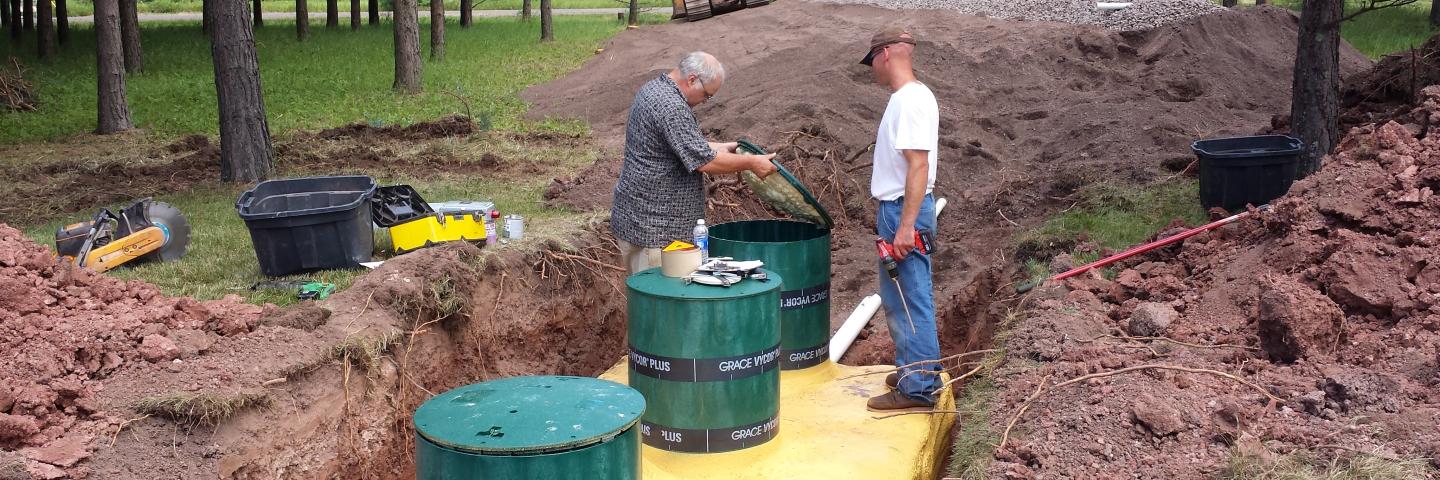Minnesota counties are required to adopt SSTS ordinances and administer SSTS programs that comply with state rules. Cities and townships may choose to regulate septic systems; if they do, their ordinance must be at least as stringent as the county's. As of 2021, 200 SSTS programs, run by counties, cities, townships, and other government units, are actively managing septic systems in Minnesota.
Counties and other local governments with SSTS programs enforce rules, review plans, approve permits and inspect new/replacement systems, and ensure compliance when a system owner has been issued a notice of noncompliance. Though they must follow state rules at a minimum, local SSTS ordinances vary across the state. Some require SSTS compliance inspections prior to property transfer, permits for SSTS repair and maintenance, and other obligations over and above state regulations.
The MPCA's role is to:
- develop technical and compliance criteria for septic systems
- establish requirements for local SSTS programs
- certify individuals and license businesses to do SSTS work
- register treatment products
SSTS local program requirements questionnaire
The MPCA initially created this survey to facilitate its local-government assessments. But the questionnaire also asks local governments to self-assess whether local ordinances and procedures are in place and operating in accordance with Minnesota Rules Chapter 7082. Contact your region's SSTS field staff with any question or to schedule local government assessments.
Developing local government ordinances
The MPCA must be notified of proposed ordinances or ordinance amendments 30 days prior to adoption. The following document can be used to assist LGUs through the ordinance development process.
Enforcement
Due to their permit and ordinance authorities, local units of government are often the first line of action for licensing enforcement activities. The MPCA provides enforcement when local actions are ineffective or local governments or SSTS professionals need assistance. The MPCA investigates written complaints and retains the authority to suspend, restrict or revoke a license. Minnesota rules outline the MPCA authorities for enforcing certification and licensing requirements.
Local units of government that encounter straight-pipe systems in their jurisdiction and need assistance bringing those properties into compliance can contact the MPCA. State law subjects homeowners who do not correct straight-pipe discharges within ten months of notification to penalties of $500 per month for each month of subsequent noncompliance (Minn. Stat. 115.55).
Citizens with contractor disputes should contact the Attorney General's Consumer Division.
Program partner web sites
- Department of Labor and Industry (DLI) - plumbing code
- Department of Health (MDH) - well code
- Department of Natural Resources (DNR) - shoreland management
- TWIST | The Wastewater Information System Tool (U.S. EPA) — A downloadable management tool that allows state and local health departments to effectively inventory and manage small wastewater treatment systems in their jurisdictions. It is designed to track information related to homes and facilities served, permits, site evaluations, types of systems, inspections, and complaints.
- H2O&M web site — operation and maintenance plan creation tool
Technical information
- EPA Septic (Onsite/Decentralized) Systems
- EPA Environmental Technology Verification Program
- National Environmental Service Center
- NSF
- University of Minnesota Onsite Sewage Treatment Program
